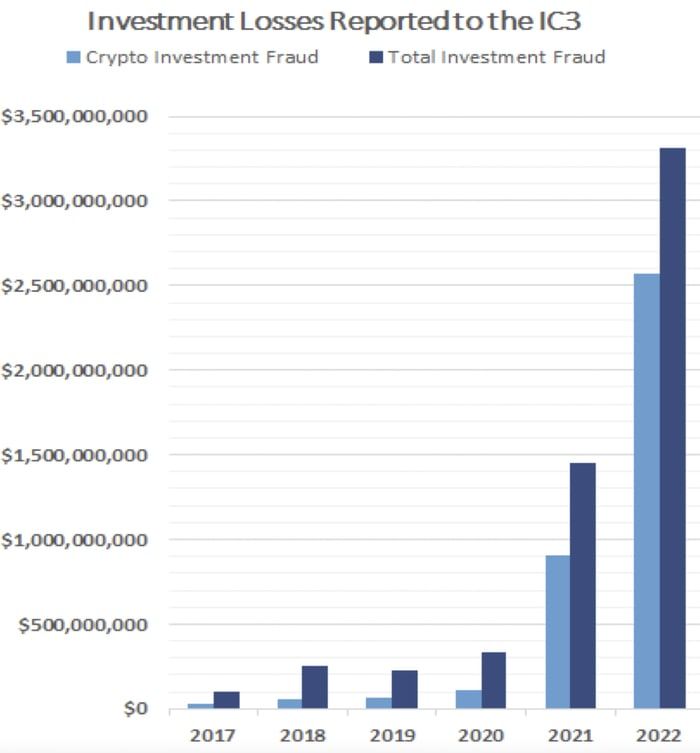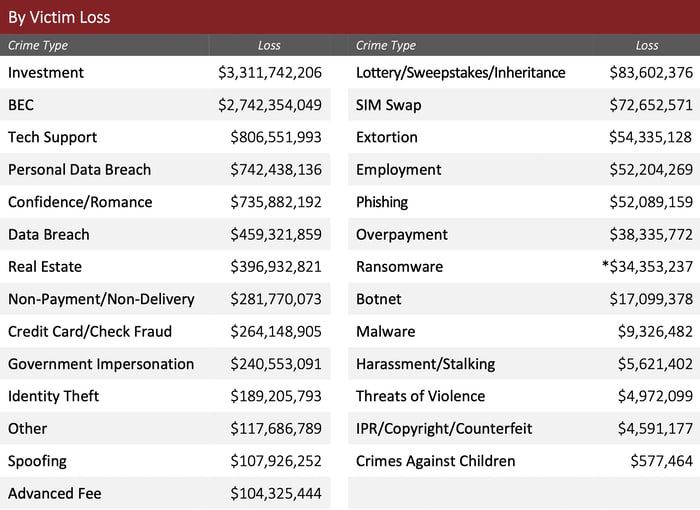FBI reveals that more money is lost to investment fraud than ransomware and business email compromise combined

The latest annual FBI report on the state of cybercrime has shown a massive increase in the amount of money stolen through investment scams.
In fact, after seven years of dominating the charts, businesss email compromise (BEC) has been knocked off its pole position in the list of losses reported to the Internet Crime Complaint Center (IC3) by investment fraud complaints, which have more than doubled from $1.45 billion in 2021 to a staggering $3.31 billion in 2022.

By comparison, business email compromise (which itself overshadows the $34.3 million losses caused by often headline-grabbing ransomware attacks) accounted for a still astonishing $2.7 billion.

There's a number of ways in which investment fraudsters operate, but typically it involves duping victims into believing that they can make large returns with minimal risk.
Much of the rise in investment fraud can be laid at the door of cryptocurrency scams. In its report, the FBI says that investment scams involving cryptocurrency rose from $907 million in 2021 to $2.57 billion in 2022, an increase of 183%.
One of the crypto-investment scams that have caused these massive losses is liquidity mining - where victims are fooled into linking their cryptocurrency wallet to an untrustworthy liquidity mining application, with the promise of a guaranteed return.
Other include:
- Hackers hijacking an individual's social media account to promote a fraudulent investment opportunity to their friends and followers.
- Creating fake social media accounts of well-known individuals, in the hope of enticing a victim into investing in a fraudulent scheme. One celebrity whose name has often been used in such schemes in tech billionaire Elon Musk.
- Fake job positions at an investment company are advertised online. Victim applicants are not offered a job but instead offered investment advice that is designed to steal as much of their money as possible.
According to the FBI, the most targeted age group reporting investment scams are aged between 30 and 49, with many taking on massive debt to cover their losses. I'm sure many would have imagined that it would be other age groups who were more likely to be susceptible to such scams - but maybe it's the case that the hype around the millions that can be made through cryptocurrency was particularly enticing to this demographic.
Despite some successes in breaking up criminal gangs operating investment scams, it's clear that there is much to be done.
And it's clear that internet crime of any flavour continues to be a considerable and growing problem. In all, the FBI says that users reported losing over $10.3 billion to cybercrime, a 50% increase from $6.9 billion the previous year.
tags
Author
Graham Cluley is an award-winning security blogger, researcher and public speaker. He has been working in the computer security industry since the early 1990s.
View all postsRight now Top posts
How to Protect Your WhatsApp from Hackers and Scammers – 8 Key Settings and Best Practices
April 03, 2025
Outpacing Cyberthreats: Bitdefender Together with Scuderia Ferrari HP in 2025
March 12, 2025
Streamjacking Scams On YouTube Leverage CS2 Pro Player Championships to Defraud Gamers
February 20, 2025
How to Identify and Protect Yourself from Gaming Laptop Scams
February 11, 2025
FOLLOW US ON SOCIAL MEDIA
You might also like
Bookmarks








